Sri Aurobindo Presiding over Nationalist Conference
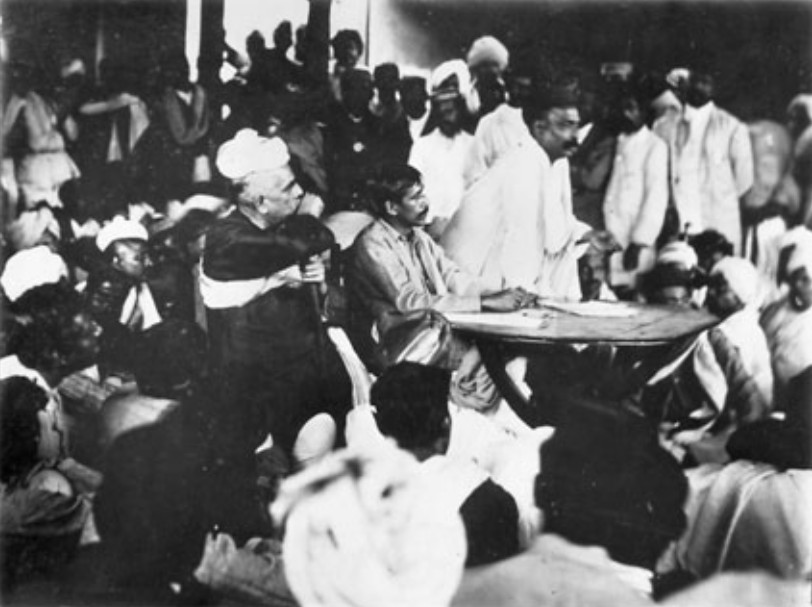
Sri Aurobindo Presiding over a Conference of Nationalist Delegates at Surat in December,1907
Sri Aurobindo, sitting with his hands on the table, flanked on his right by G.S. Khaparde and on his left by Lokmanya Bal Gangadhar Tilak, speaking
Two Decisive Happenings at Surat
"History very seldom records the things that were decisive but took place behind the veil; it records the show in front of the curtain. Very few people know that it was Sri Aurobindo (without consulting Tilak) who gave the order that led to the breaking of the Congress and was responsible for the refusal to join the new-fangled Moderate Convention which were the two decisive happenings at Surat..."
Based on: CWSA > Letters on Himself.. > Political Career, 1906-1910 > Page 26
Moderates vs Nationalists
In 1906 Sri Aurobindo came to Bengal with the purpose of a public initiation of a more forward and direct political action than the moderate reformism which had till then been the creed of the Indian National Congress. He joined the 'New Party' which had been recently formed in the Congress and persuaded its chiefs in Bengal to come forward publicly as an All-India party - the Nationalist Party - with Tilak at its head and to attack the then dominant Moderate (Reformist or Liberal) oligarchy of veteran politicians and capture from them the Congress and the country. This was the origin of the historic struggle between the Moderates and the Nationalists (called by their opponents Extremists) which in two years changed altogether the face of Indian politics.
Congress Session at Calcutta in 1906
The first great public clash between the two parties took place in the sessions of the Congress at Calcutta where Sri Aurobindo was present but still working behind the scenes. The Extremists, though still a minority, succeeded under the leadership of Tilak in imposing part of their political programme on the Congress. The Congress consisting of both Moderates and Nationalists unanimously resolved to have for its goal Swaraj or Self-government and Swadeshi, Boycott and National Education as the effective means for realising it. The Moderates at the time did not raise any dissentient voice but they seem to have felt that their position was somewhat compromised by these resolutions; and they had since then, been looking forward to an opportunity when they might return to their old position regarding ideals and methods of political progress in India.
Moderate plan for Retrogression
The Nationalists came to know that Bombay Moderate leaders were bent upon receding from the position taken up by the Calcutta Congress on Swaraj, Boycott and National Education. The Moderates had drafted a new constitution where there was a direct attempt to tamper with the ideal of Self-Government on the lines of the Self-Governing colonies, as settled at Calcutta and to exclude the Nationalists from the Congress by making the acceptance of this new creed an indispensable condition of Congress membership.
How the Moderates wanted to retrogress - Resolution passed in Calcutta Session vs Draft resolution at Surat (Refer to 'Appendix: How they wanted to go back')Why the Moderates chose Surat?
The session of the Congress had first been arranged at Nagpur, but Nagpur was predominantly a Mahratta city and violently extremist. Gujerat was at that time predominantly moderate, there were very few Nationalists and Surat was a stronghold of Moderatism though afterwards Gujerat became, especially after Gandhi took the lead, one of the most revolutionary of the provinces. So the Moderate leaders decided to hold the Congress at Surat. The Nationalists however came there in strength from all parts, they held a public conference with Sri Aurobindo as president and for some time it was doubtful which side would have the majority, but finally in this moderate city that party was able to bring in a crowd of so-called delegates up to the number of 1300 while the Nationalists were able by the same method to muster something over 1100.
Swamp it or Split it!
It was known that the Moderate leaders had prepared a new constitution for the Congress which would make it practically impossible for the extreme party to command a majority at any annual session for many years to come. The younger Nationalists, especially those from Maharashtra, were determined to prevent this by any means and it was decided by them to break the Congress if they could not swamp it; this decision was unknown to Tilak and the older leaders but it was known to Sri Aurobindo. At the sessions Tilak went on to the platform to propose a resolution regarding the presidentship of the Congress; the president appointed by the Moderates refused to him the permission to speak but Tilak insisted on his right and began to read his resolution and speak. There was a tremendous uproar, the young Gujerati volunteers lifted up chairs over the head of Tilak to beat him. At that the Mahrattas became furious, a Mahratta shoe came hurtling across the pavilion aimed at the President Dr. Rash Behari Ghose and hit Surendra Nath Banerji on the shoulder. The young Mahrattas in a body charged up to the platform, the Moderate leaders fled and after a short fight on the platform with chairs the session broke up not to be resumed.
Congress Splits!
The Moderate leaders decided to suspend the Congress and replace it by a national conference with a constitution and arrangement which would make it safe for their party. Meanwhile Lajpatrai came to Tilak and informed him that the Government had decided, if the Congress split, to crush the Extremists by the most ruthless repression. Tilak thought, and the event proved that he was right, that the country was not yet ready to face successfully such a repression and he proposed to circumvent both the Moderate plan and the Government plan by the Nationalists joining the conference and signing the statement of adhesion to the new constitution demanded by the Moderates.
Congress Ceases, Moderates Decline
Sri Aurobindo and some other leaders were opposed to this submission; they did not believe that the Moderates would admit any Nationalists to their conference (and this proved to be the case) and they wanted the country to be asked to face the repression. Thus the Congress ceased for a time to exist; but the Moderate conference was not a success and was attended only by small and always dwindling numbers. Sri Aurobindo had hoped that the country would be strong enough to face the repression, at least in Bengal and Maharashtra where the enthusiasm had become intense and almost universal.
A Congress Pledged to Nationalism
Sri Aurobindo thought also that even if there was a temporary collapse the repression would create a deep change in the hearts and minds of the people and the whole nation would swing over to nationalism and the ideal of independence. This actually happened and when Tilak returned from jail in Burma after 6 years he was able in conjunction with Mrs Besant not only to revive the Congress but to make it representative of a nation pledged to the nationalist cause. The Moderate party shrank into a small body of liberals and even these finally subscribed to the ideal of complete independence.
Extract from: CWSA > Autobiographical Notes > The Surat Congress > Page 82
The Real Questions in Debate
...the real questions in debate were those which involved the whole future development of the spirit and form of self-government in this country. Were that spirit and form to be democratic or oligarchic? Were they to be constitutional in procedure or governed by arbitrary and individual choice and discretion? Was the movement to be progressive and national or conservative and parochial in its aims, policy and spirit? These were the real issues. The Nationalist party stood for democracy, constitutionalism and progress. The Moderate party, governed by an exaggerated respect for old and esteemed leaders, helped, without clearly understanding what they did, those who stood for oligarchy, arbitrary procedure and an almost reactionary conservatism. Personal idiosyncracies, preferences, aversions settled like a thick cloud over the contest, the combatants on both sides flung themselves on every point of difference material or immaterial as a pretext or a weapon, the tactics of party warfare were freely used and, finally, the deliberate obstinacy of a few Moderate leaders in avoiding discussion of the points of difference and the unruly ardour of the younger men on both sides led to the violent scenes at Surat and the break-up of the Congress.
Extract from: CWSA > Karmayogin > 'An Open Letter To My Countrymen' - 31.July.1909
Nationalist Leaders at Surat
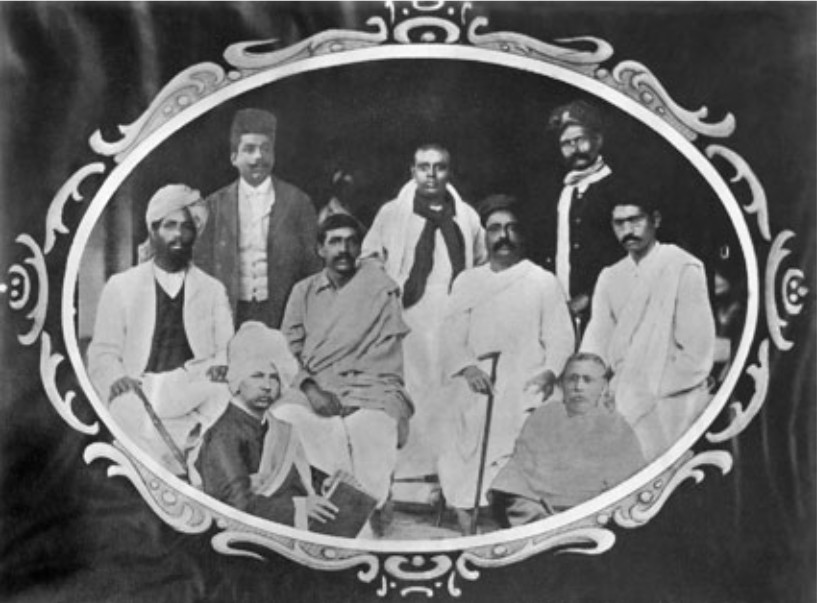
Group Photo of Sri Aurobindo amongst other Nationalist leaders at Surat, December 1907
Seated in the front line: (L to R) Ganesh Srikrishna Khaparde and Ashwini Kumar Dutt
Seated in the middle line: Sardar Ajit Singh (uncle of Bhagat Singh), Sri Aurobindo, Lokmanya Bal Gangadhar Tilak (with stick in hand) and Saiyad Haidar Reza
Standing: (L to R) Dr. Munje, Ramaswamy, K. Kuverji Desai
Leaders of the Nationalist Party
The main leaders of the Nationalist Party at Surat were: Lokmanya Tilak, Sri Aurobindo, G.S. Kharpade, Sardar Ajit Singh, H. Mukherjee, B.C. Chatterjee. Subramaniam Bharati and S. Doraiswamy Iyer had arrived from Madras.
Other note-worthy persons
Maharashtrian Saint Sakhare Bua, Satyendranth Tagore, Motilal Ghosh (Amrita Bazar Patrika), Motilal Nehru, Dr Rutherford (Government Representative), Henry Nevinson (British Correspondent)
The Chain of Events at Surat Session
Dec.1907
Nationalists' Journey to Surat More
Conference of Nationalist Delegates
24.Dec.1907
Police Report
Surat, December 25th, 1907. - The first meeting of the Nationalists' Conference was held on the 24th December in the afternoon. Babu Arvind Ghose, of the Bande Mataram fame, presided. The meeting was not open to the public. Only those who paid the fee of Re. 1 and signed the pledge of being Nationalists were admitted. There were more than a thousand persons present. On the motion of Mr. Khaparde of Amraoti Mr. Ghose, being elected to the Chair, observed that the object of the Conference was to disseminate the gospel of Nationalism and that for that purpose the Nationalists must be prepared to make all sorts of sacrifices. For the purpose of pushing forward the work of Nationalism an organisation was necessary and hence this conference. It was the object of the Conference to enforce the views of the Nationalists on the Indian National Congress and to make the Congress, which had hitherto been a body for the concentration of opinion, a body for the concentration of work. He then called upon Mr. B.G. Tilak to state in detail the object of the Conference.
From Bombay Presidency Police, Abstract of Intelligence, Volume XXI of 1908, page 5.
Day 1 of Surat Congress Session
26.Dec.1907: Eye-witness Report by Henry Nevinson
Sitting is Suspended
Dewan Bahadur Ambalal S. Desai,...rose formally to propose that Dr. Ghose, already designated President, should now take the Presidential Chair. At the name of Ghose, the deep murmur of dissent was heard again, and one shrill voice cried, "Never!". But the moment the Dewan sat down, Mr. Banerjea was seen standing in his place beside the table.. to second the proposal that Dr. Ghose should take the Chair. Hardly had his immense voice uttered ten words when... the tumult burst and no more was heard.
Waving their arms, their scarves, their sticks and umbrellas, a solid mass of delegates and spectators on the right of the Chair sprang to their feet and shouted without a moment's pause... the whole ten thousand were on their feet, shouting for order, shouting for tumult. Mr. Malvi (Chairman of the Reception Committee) still half in the chair, rang his brass Benares bell and rang in vain. Surendranath sprang upon the very table itself. Even a voice like his was but a whisper in the din. Again and again he shouted, unheard as silence. He sat down and for a moment the storm was lulled. The voices of the leaders were audible, consulting in agitated tones - Dr. Ghose shrill, impatient and perturbed with anger; Mr. Gokhale distressed, anxious, harassed with vain negotiation and sleepless nights. Already one caught the word 'suspension'. 'If they will not hear Surendranath, whom will they hear?' said one. 'It is an insult to the Congress,' said another. 'An insult to Bengal,' cried a third. Again Surendranath sprang on the table, and again the assembly roared with clamour. Again the Chairman rang his Benares bell, and again in vain. In an inaudible voice, like a sob, he declared the sitting suspended.
From: Henry Nevinson > 'The Spirit of New India' > Page 247
Day 2 of Surat Congress Session
27.Dec.1907: Eye-witness Report by Henry Nevinson
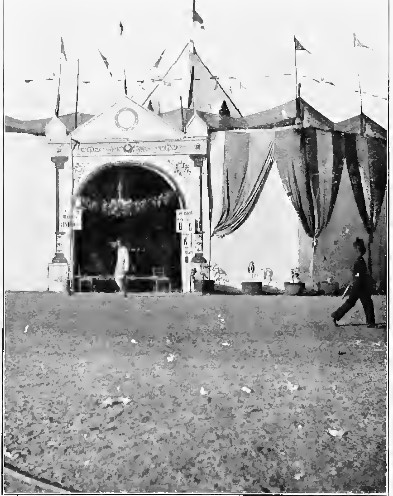
Pandal at Surat Congress Session (before uproar) in December, 1907
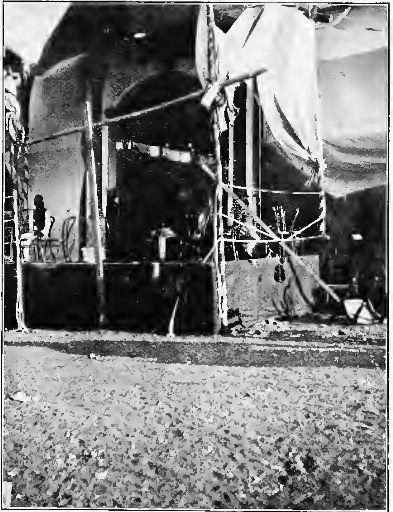
Pandal at Surat Congress Session (after uproar) in December, 1907
National Congress Dissolving in Chaos
In deliberate and expectant silence the proceedings began. Mr. Malvi called upon Mr. Banerjea to take up his speech, seconding the appointment of Dr. Ghose as President... In inaudible words Mr. Malvi proposed that Dr. Ghose should take the Chair as President, and amid various shouting he declared the motion carried... As when lightning flashes in air surcharged with storm, Mr. Tilak was seen standing straight in front of the Presidential Chair itself, expostulating, protesting, all in that calm, decisive voice of his, the voice of a man indifferent to fate. He had given notice of an amendment, he was there to move it, and there he would remain. "You cannot move an adjournment of the Congress," cried Mr. Malvi; "I declare you out of order." "I wish to move an amendment to the election of President, and you are not in the Chair," Mr. Tilak replied. "I declare you out of order!" cried Dr. Ghose. "You have not been elected," answered Mr. Tilak; "I appeal to the delegates."
Uproar drowned the rest. With folded hands Mr. Tilak faced the audience. On either side of him young Moderates sprang to their feet, wildly gesticulating vengeance. Shaking their fists and yelling to the Chair, they clamoured to hurl him down the step of the platform. Behind him Dr. Ghose mounted the table, and, ringing an unheard bell, harangued the storm in shrill, agitated, unintelligible denunciations. Restraining the rage of the Moderates, inseminating peace if ever man inseminated, Mr. Gokhale, sweet-natured even in extremes, stood beside his old opponent, flinging out both arms to protect him from the threatened onset. But Mr. Tilak asked for no protection. He stood there with folded arms, defiant, calling on violence to do its worst, calling on violence to move him, for he would move for nothing else in hell or heaven. In front, the white-clad audience roared like a tumultuous sea.
Suddenly something flew through the air - a shoe! - a Mahratta shoe, reddish leather, pointed toe, sole studded with lead! It struck Surendranath Banerjea on the cheek; it cannoned off upon Sir Ferozeshah Mehta. It flew, it fell, and, as at a given signal, white waves of turbaned man surged up the escarpment of the platform. Leaping, climbing, hissing the breath of fury, brandishing long sticks, they came, striking any head that looked to them Moderate, and in another moment, between brown legs standing upon the green-baize table, I caught glimpses of the Indian National Congress dissolving in chaos. Like Goethe at the battle of Valmy, I could have said that today marks the beginning of a new era, and you can say that you were present at it.
From: Henry Nevinson > 'The Spirit of New India' > Page 255
Nationalist Conference
28.Dec.1907: Eye-witness Report by Henry Nevinson

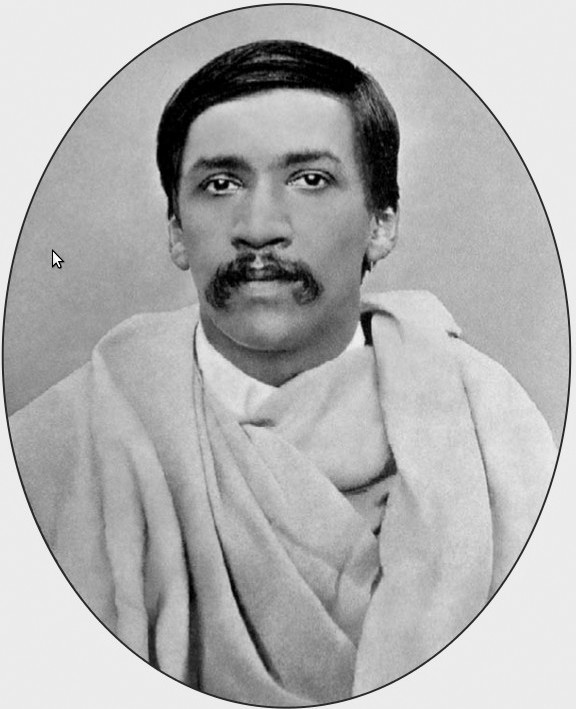
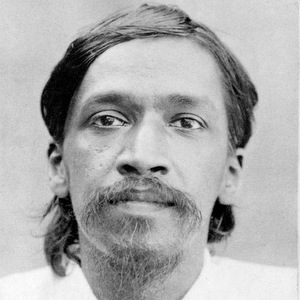
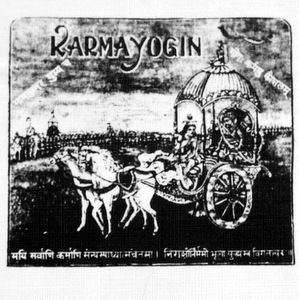
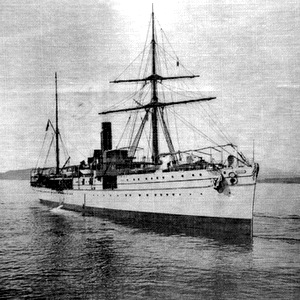
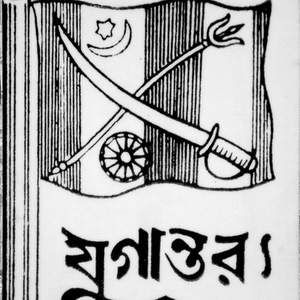
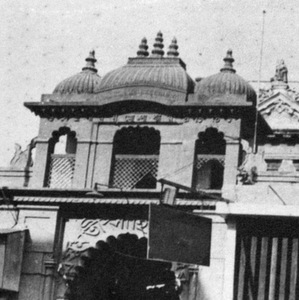
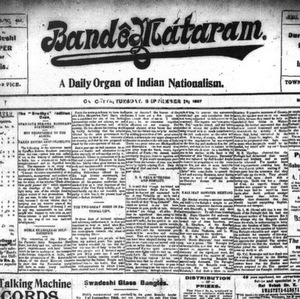
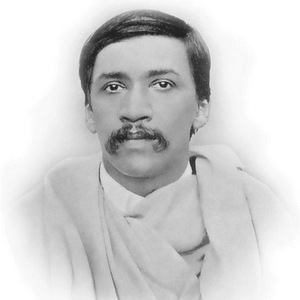
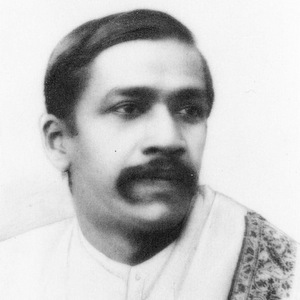
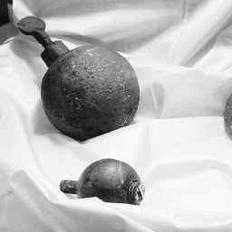
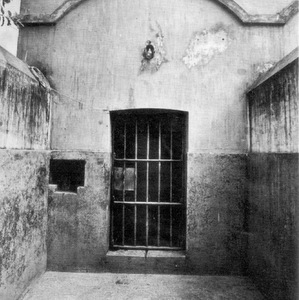
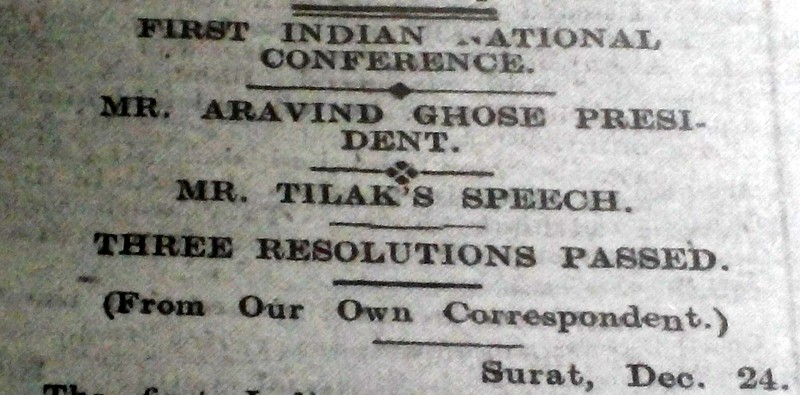
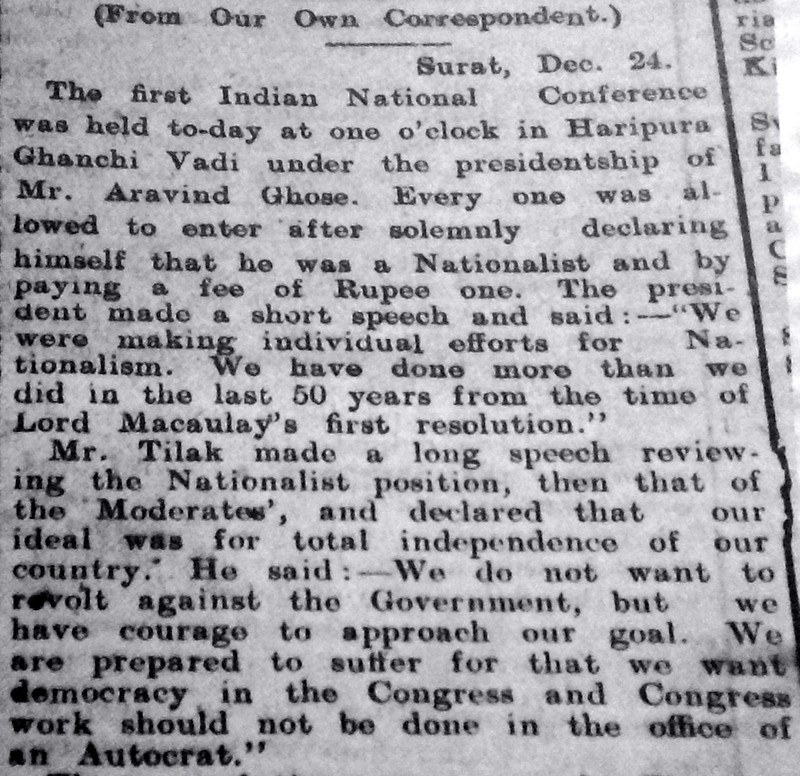
No comments:
Post a Comment